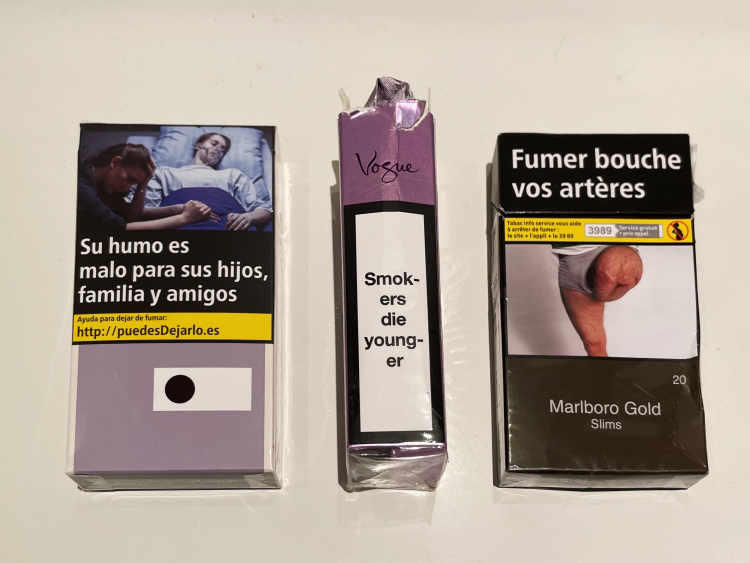Lucky Strikes or Strike it Lucky

Growing up in Europe changed my entire perspective on smoking because everyone here does it. However, after attending an American university and making friends, I've realized how uncommon it is in the United States. My main question when making American friends is why they started smoking in France, because smoking is obviously very toxic and difficult to quit. My smoking experience was very different from that of a few people that I interviewed. I had family members who smoked in the house and then I had friends who started smoking at 14 and would ask why I wasn't smoking at that age, making me feel like a fish out of water. Fortunately, I did not begin at that age.
When teenagers start drinking and partying at the age of 18, we forget everything, especially when we are intoxicated. I remember taking my first cigarette puff when I was 16 years old, making a big deal out of it and thinking I was going to die. Fast forward 5 years and I'm a regular smoker. When I spoke with some American students, the majority of them had never smoked before enrolling at The American University of Paris. I was very curious to find out why. Having reached the age of 18, one would surely want to avoid smoking for as long as possible. While interviewing other students, some would claim that Juul gave them nicotine addictions and that this is how they began smoking in Paris.
When I asked AUP student Elena why she didn't start smoking the month before she arrived, she responded that "buying cigarettes in America is much more difficult than here," which I understood due to the legal age limit. When I visited the United States, I asked for a pack of vogues; the man looked at me strangely and had no idea what I was talking about, so I looked behind him and tried to figure out which cigarettes I wanted to buy. What surprised me the most was that there was not a single advertisement on the packets. Which brought me to my next question: why buy cigarettes here when there are disgusting advertisements rather than buy a beautiful pink-wrapped pack of cigarettes in the United States? To be honest, every time I asked this question, as I was initially perplexed by the packaging, I was told to "just ignore it.”
According to one source, tobacco company advertising and promotion influences young people to begin using tobacco. Teens who are exposed to cigarette advertisements frequently find the advertisements appealing, which may increase the desire of adolescents to smoke.
Image Credit: Natasha HersmanElizabeth, one of the students I interviewed, stated that she began smoking at the age of 18 and did so only because she was surrounded by it when her friends smoked and tried it out. This gave me the impression that if people close to you smoke, you are more likely to smoke to avoid feeling left out. Many teenagers go through significant developmental changes, forming their own identities and taking greater risks. They also start to care more about being accepted by their peers. According to one study, cigarette advertisements may make teens believe that smoking will make them popular, sophisticated, attractive, or tough.
When I first started smoking, I don't recall seeing any advertisements on the packaging; I recall seeing them on tobacco packs but not on cigarette packs. A few years later, when companies started printing them and it was illegal if they didn't, I felt very uneasy about purchasing a packet. This wasn't easy because I believe I developed a nicotine addiction, not to the point of experiencing withdrawal symptoms, but to the point where I couldn't go a night out drinking without them. This led me to my next question, which was about going out with American students. Why not smoke but only when you're drinking? Nicotine changes how the brain responds to alcohol. This means that you will need more alcohol to get the same feel-good effect as a nonsmoker after a couple of drinks. Meanwhile, the alcohol raises the level of feel-good chemicals produced by nicotine in the brain.
Camille, a regular smoker, was another student I interviewed. I asked her if she recalled when cigarette packet labels first appeared, and she said she did, starting when she was 16, and that they worried her. Apart from that, Camille has stated that she believes they are irrelevant because most people disregard them and they are simply unattractive.
Image Credit: Natasha HersmanThere are strict guidelines in place for the layout of tobacco and cigarette packaging. In accordance with French tobacco control laws, all packs of cigarettes and rolling tobacco must be in plain packaging. The packaging must be of consistent color, size, and shape, and it may only contain the specified information and health warnings. All smoked tobacco products must have combined text and picture health warnings that cover 65 percent of the front and back of the package. Each side of the package must contain one general warning and one informational message about constituents and emissions. One authorized text warning must occupy 30 percent of the front and back of the tobacco product package for smokeless tobacco products.
So, the most important question is, why does France have the greatest influence on American students to smoke here? It's because every adolescent here smokes! When I'm not smoking and everyone else is, my hands feel awkward."Smoking is more of a social thing," all of the students I've interviewed have said. Most of them agreed with me and mentioned that it’s the act of smoking and the movement which makes it somewhat classy. According to my research, smoking begins with the act of smoking and how it is portrayed. I've also discovered that cigarette advertisements on packaging have no effect on the buyer and, in fact, make the smoker more drawn to it.









